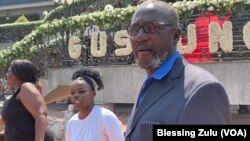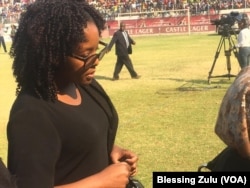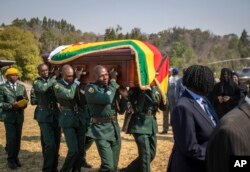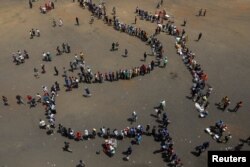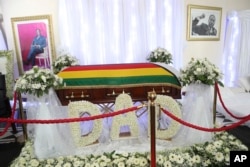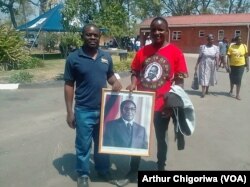* Zimbabwe’s founder died six days ago
* Body lying in state in Harare
* Successor wants burial at grandiose shrine
* Family feel bitter over Mugabe’s ousting
By MacDonald Dzirutwe and Alexander Winning
HARARE (Reuters) - Zimbabwe’s former president, Robert Mugabe, will be buried at a private ceremony at a date still to be decided, his family said on Thursday, in an embarrassment for his successor who wants him interred at a national shrine on Sunday.
Mugabe, who ruled Zimbabwe for 37 years until he was ousted by his own army in November 2017, died in a Singapore hospital six days ago aged 95.
His body arrived in Zimbabwe from Singapore on Wednesday and started three days of lying in state on Thursday.
Mugabe is proving as polarising in death as he was in life, as the fight over where he will be buried threatens to undermine President Emmerson Mnangagwa, Mugabe’s former deputy who conspired to overthrow him.
Mnangagwa and the ruling ZANU-PF party want Mugabe buried at a national monument to heroes of the liberation war against white minority rule, in an attempt to unite the country behind their political and economic agenda. The government had planned for a state funeral on Saturday and then burial on Sunday.
But some of Mugabe’s relatives have pushed back against that plan. They share Mugabe’s bitterness at the way former allies including Mnangagwa toppled him and want him buried in his home village some 85 km (50 miles) from Harare.
Leo Mugabe, the late president’s nephew, said the burial ceremony would be private, without saying where it would be.
“If I tell you (where it will be) then it won’t be private,” he said. “The family is the one that makes a decision,” he added.
Snubbing a burial at National Heroes Acre, a grandiose monument on a hill overlooking Harare, would be a major snub to Mnangagwa, the ruling party Mugabe helped found and the country’s liberation war veterans, who broke with Mugabe in 2016 and endorsed Mnangagwa’s rise to power.
The family issued a statement saying it was concerned about the manner in which the government was preparing the programme for Mugabe’s funeral “without consulting his immediate family”.
The family “also observed with shock that the Government of Zimbabwe is attempting to coerce us to accept a programme for funeral and burial” that was contrary to Mugabe’s wishes, the statement said.
Mnangagwa, flanked by security and half a dozen soldiers carrying rifles, visited Mugabe’s palatial home, known as Blue Roof, in the capital on Thursday to pay his respects.
A choir wearing yellow T-shirts bearing Mnangagwa’s face sang songs as he arrived. Around a hundred well-wishers sat under a marquee on a lawn beneath the main house, waiting for their turn to see the coffin.
“As long as ZANU-PF is in power and as long as I am leading, no one will deviate, you remain our icon, our commander and founding father,” Mnangagwa said of Mugabe, addressing relatives and associates in the room where the coffin draped in the Zimbabwean flag was being kept.
Mugabe’s body was later flown to the Rufaro soccer stadium in Harare’s Mbare high density suburb, where thousands of mourners filed past the open coffin.
There was a brief stampede, as people rushed forward to get their chance to catch a glimpse of their former leader.
The body was expected to be on display at the stadium, the venue where he took his first oath at independence in 1980, for another day on Friday before a state funeral planned for the National Sports Stadium on Saturday.
Trust Nyakabawo, a Mbare resident, told Reuters at the Rufaro Stadium that he wanted Mugabe to be buried at National Heroes Acre along with other liberation fighters.
“We are in pain after his death because we were so used to seeing him alive as a father figure that led the country well. We need him to go to Heroes Acre,” another mourner, Prisca Mutandi, said as the helicopter carrying Mugabe’s coffin landed outside the stadium.
Many Zimbabweans remember Mugabe as their country’s liberator from white minority rule and praise him for broadening people’s access to education and land.
But that memory is also tinged with sadness, as he presided over an economy wrecked by hyperinflation, shortages and deeply entrenched corruption, and left a divided nation with loyalties split between the country’s two largest political parties, ZANU-PF and the opposition MDC.
Mnangagwa has found it hard to revive the economy, and steps his government has taken this year to reintroduce the Zimbabwean dollar have spurred steep price rises that have compounded people’s daily hardships. (Additional reporting by Siphiwe Sibeko and Gift Sukala Writing by Olivia Kumwenda-Mtambo Editing by Gareth Jones, Peter Graff and Giles Elgood)




